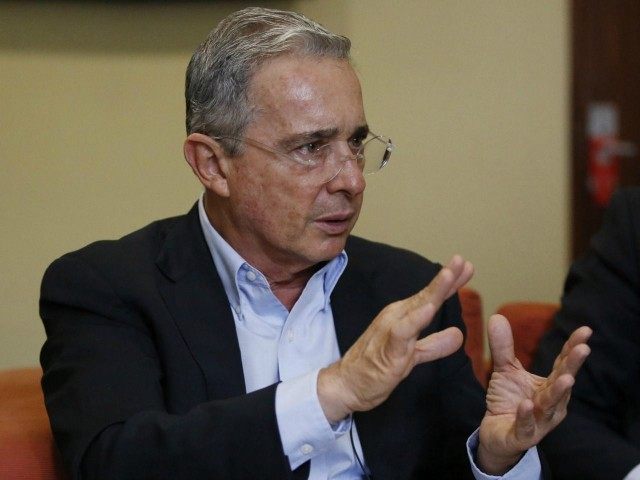The Colombian government has opened an investigation into senator and former President Álvaro Uribe, largely responsible for the destabilization of the FARC terrorist organization in the mid-2000s.
While the nation’s public prosecutor claims there is reason to believe Uribe had a hand in a 1997 massacre, high-level officials claim he is facing retribution from the FARC following their deal with the Colombian executive.
Uribe, who served as the nation’s president from 2002 to 2010, is being investigated for his alleged role in a paramilitary attack on the town of El Aro, Antioquia, in 1997 that resulted in the destruction of numerous peasant homes, multiple incidents of rape, and 15 deaths. Uribe was governor of Antioquia at the time.
The investigation allegedly follows up on testimony given to an American court by Diego Fernando Murillo, known as “Don Berna,” linking Uribe to the attack. Don Berna was the head of the defunct paramilitary and narcotrafficking group the United Self-Defense Forces of Colombia (AUC), and is currently in prison in the United States for drug-related offenses.
Uribe has dismissed the accusations as “slander” and nothing more. Others, however, have accused the Colombian government of trying to remove Uribe from his position of power in the legislature in order to prevent him from making a deal with the Revolutionary Armed Forces of Colombia (FARC), a Marxist terror group, impossible.
Speaking to Colombia’s RCN Radio, the nation’s Inspector General, Alejandro Ordoñez, accused the government of persecuting Uribe as part of a secret deal brokered with the FARC. “The FARC has always issued as a condition [of any deal] judicial proceedings against ex-President Uribe,” he stated, “that this announcement has been made can be explained as [the government] complying and has a direct relationship with these demands by the FARC.”
“Never have drug lords achieved so much in this country, even under Pablo Escobar,” Ordoñez lamented.
Uribe is widely considered the most successful actor against the FARC in its history. During his tenure, he reached out to the CIA and President George W. Bush, who taught the Colombian military how to use counterterrorism techniques developed for use against al-Qaeda in Iraq and Afghanistan against the FARC. Together, Bush and Uribe managed to eliminate a significant percentage of the FARC’s leadership, until Timochenko was forced to flee to Cuba, where the FARC were welcomed warmly.
President Juan Manuel Santos—Uribe’s former defense minister—has taken a radically different approach to handling the FARC. He announced a deal two weeks ago with the head of the FARC, a man known as “Timochenko,” who is currently lodged in Havana, avoiding extradition. Santos called the deal a “genuine solution” before the United Nations General Assembly last week, and urged other nations to use it as a model to solve their violent disputes.
The FARC deal would require terrorists to submit their weapons to Colombian police stations within 60 days and subject themselves to a tribunal, where those found guilty of “political” crimes would not face jail time, but probation. Uribe has been the loudest opposition to this deal, arguing that the “political” moniker allows the government to sweep a number of crimes against humanity, drug-related charges, and others under one category, which would allow known terrorists to roam free. “Drug trafficking to finance terrorism is not a political crime–on the contrary, it is a continued, unforgivable atrocity,” he wrote in a Twitter note following the announcement.
The FARC is the world’s wealthiest non-jihadist terrorist group, and the second-wealthiest terrorist organization in the world, second only to the Islamic State.

COMMENTS
Please let us know if you're having issues with commenting.